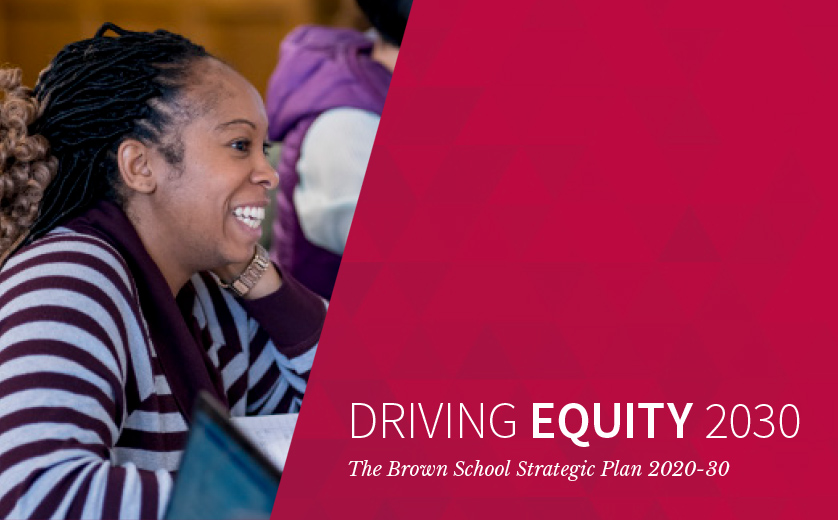Core Commitment
Transdisciplinary Research and Education
Transdisciplinarity is not an end but a means to address serious social, health and structural challenges. Each of the Brown School’s three disciplines must demonstrate singular strength, while also being capable of intensive collaboration to effectively cross boundaries and address our world’s most complex issues.
We embrace the opportunity and responsibility to train the best social work, public health and social policy professionals who share the desire to work together toward impactful change. We continue to commit to solving real-world problems by leveraging and convening expertise across disciplines and perspectives—within and outside of our walls.
Progress Reports
Progress Report 2022
The team is creating a leadership and administrative structure within the Brown School that advances transdisciplinary teaching and research. This has resulted in the creation of two positions: the Associate Dean for Transdisciplinary Faculty Affairs held by Melissa Jonson-Reid and the Associate Dean for Transdisciplinary Research held by Fred Ssewamala. Both Jonson-Reid and Ssewamala completed an internal scan of TD course participation at the Brown School and met with all faculty about research, teaching, and career development. The committee is working to identify how the Brown School liaises with the university’s agenda.
Building upon the culture of collaboration to encourage and support transdisciplinary agendas in teaching and research, job postings now include language on how the Brown School provides an environment for transdisciplinary research. A workgroup has completed a transdisciplinary definition document. Specific language regarding transdisciplinary and team science is included in the new draft tenure document under review by the Brown School interim co-deans and ultimately to be reviewed by the WashU General Counsel.
Goals and Objectives
Goal 1: Strengthen the transdisciplinary and team science community across the university to better facilitate and expand problem-solving approaches to complex social and health issues. [The workgroup envisioned a somewhat parallel process between and within Brown School and University Level activities thus there are some overlapping dates among various action under subsequent goals.]
Objectives:
- Complete TD definition, establish process for development of TD Framework, and review Tenure and Promotion to lay foundation for championing university-level processes [note that this first objective lays the internal groundwork for Brown School’s active participation as well as initial engagement in a broader university level process].
- Identify & work collaboratively toward elimination of barriers to transdisciplinary research and teaching at Wash U, with attention to issues of culture, resources, incentives, and policies [The workgroup envisions this as a fact-finding stage that brings together information about internal processes and external models to support the overall goal].
- Work collaboratively to identify opportunities and provide space, time, and resources across Wash U to facilitate a transdisciplinary approach (example: faculty fellowship in a different area of the university).
Goal 2: Build a leadership and administrative structure within the Brown School that significantly advances transdisciplinary teaching and research. [Workgroup envisioned this as a parallel process with university efforts that follows the initial development of the definition and early formation of guiding framework and information gathering in Ob 1.1].
Objectives:
- Lead collaborative effort across Wash U schools to identify an agenda addressing priority questions/challenges that require transdisciplinary solutions.
- Expand and redefine a Brown School research office with expertise, capacity and responsibility for managing complex national and global transdisciplinary projects across diverse agencies and funding mechanisms.
- Lead collaborative efforts across Wash U units to establish & fund infrastructure to develop & connect schools, offices, centers, and individuals.
- Establish the framework to expand collaborative efforts within the Brown School and across Wash U schools and administration to identify mutually beneficial and pedagogically important cross-program teaching and student participation.
- Articulate a transdisciplinary agenda to National Councils and other representative groups aligned with all Wash U schools and programs, in an effort to encourage responsiveness that will facilitate the identification of and support for emergent opportunities.
Goal 3: Build upon our culture of collaboration to encourage and support transdisciplinary agendas in teaching and research within the Brown School.
Objectives:
- Amend the school’s system of recognition, promotion, and merit increase to include transdisciplinary teaching and research (follows initial policy and framework development in Obj 1.1).
- Create and fund infrastructure to support transdisciplinary teaching and research.
Goal 4: Move scientific discovery into social impact through policy, practice, and teaching.
Objectives:
- Create and fund infrastructure for proactive and strategic translation of research results into best practices.
- Demonstrate leadership in team science, including engaging community user organizations and stakeholders at all stages of the research process.

“The Brown School and its partners have made important steps toward transdisciplinary scholarship and teaching. A strategic focus will allow us to take this work to the next level.”
–MELISSA JONSON-REID, RALPH AND MURIEL PUMPHREY PROFESSOR OF SOCIAL WORK RESEARCH